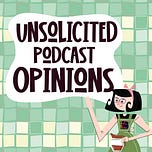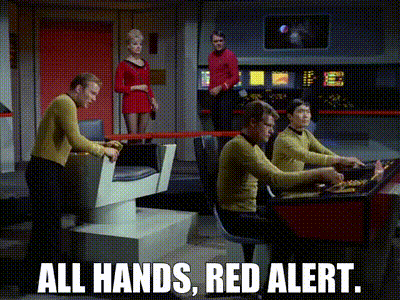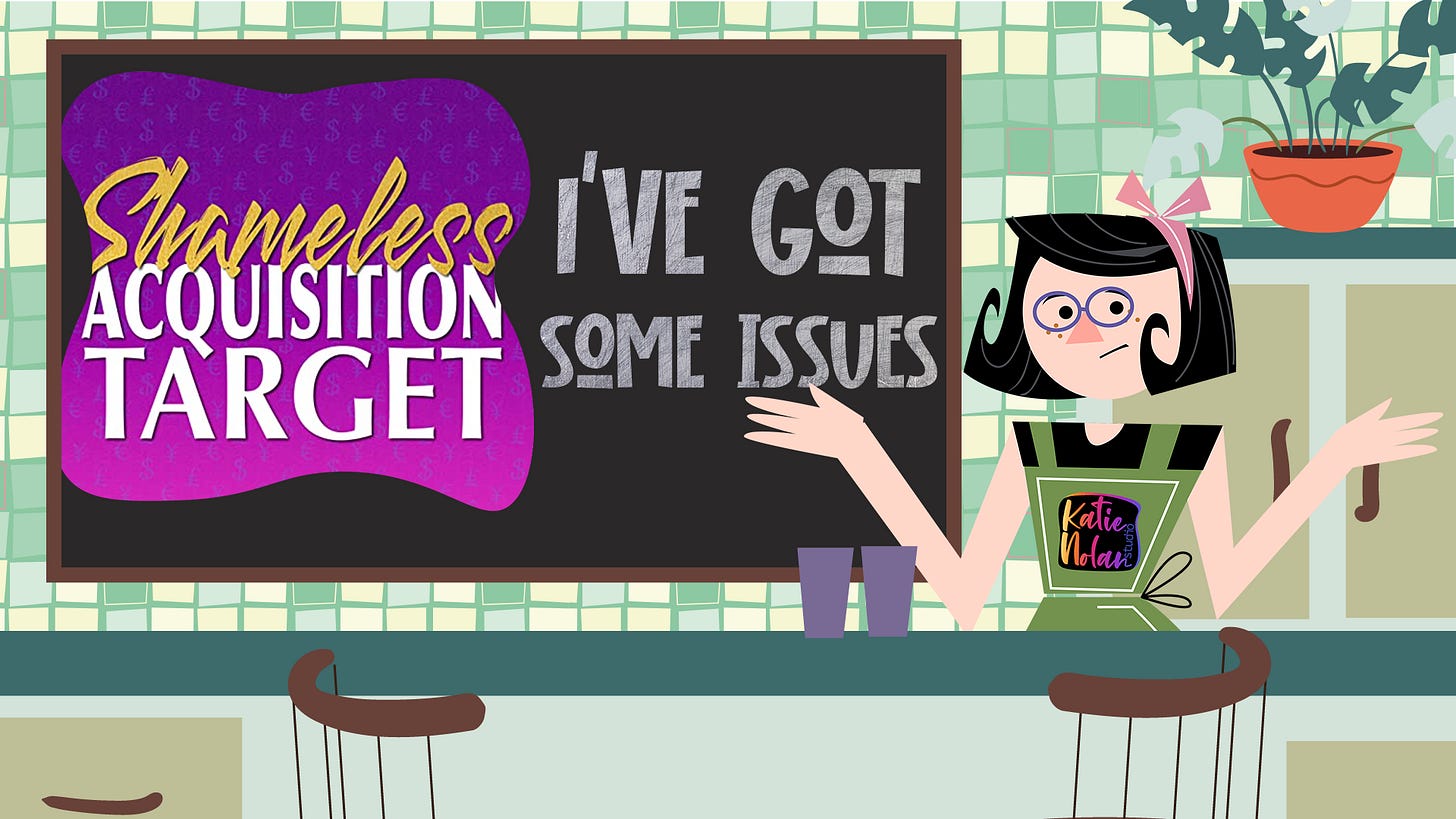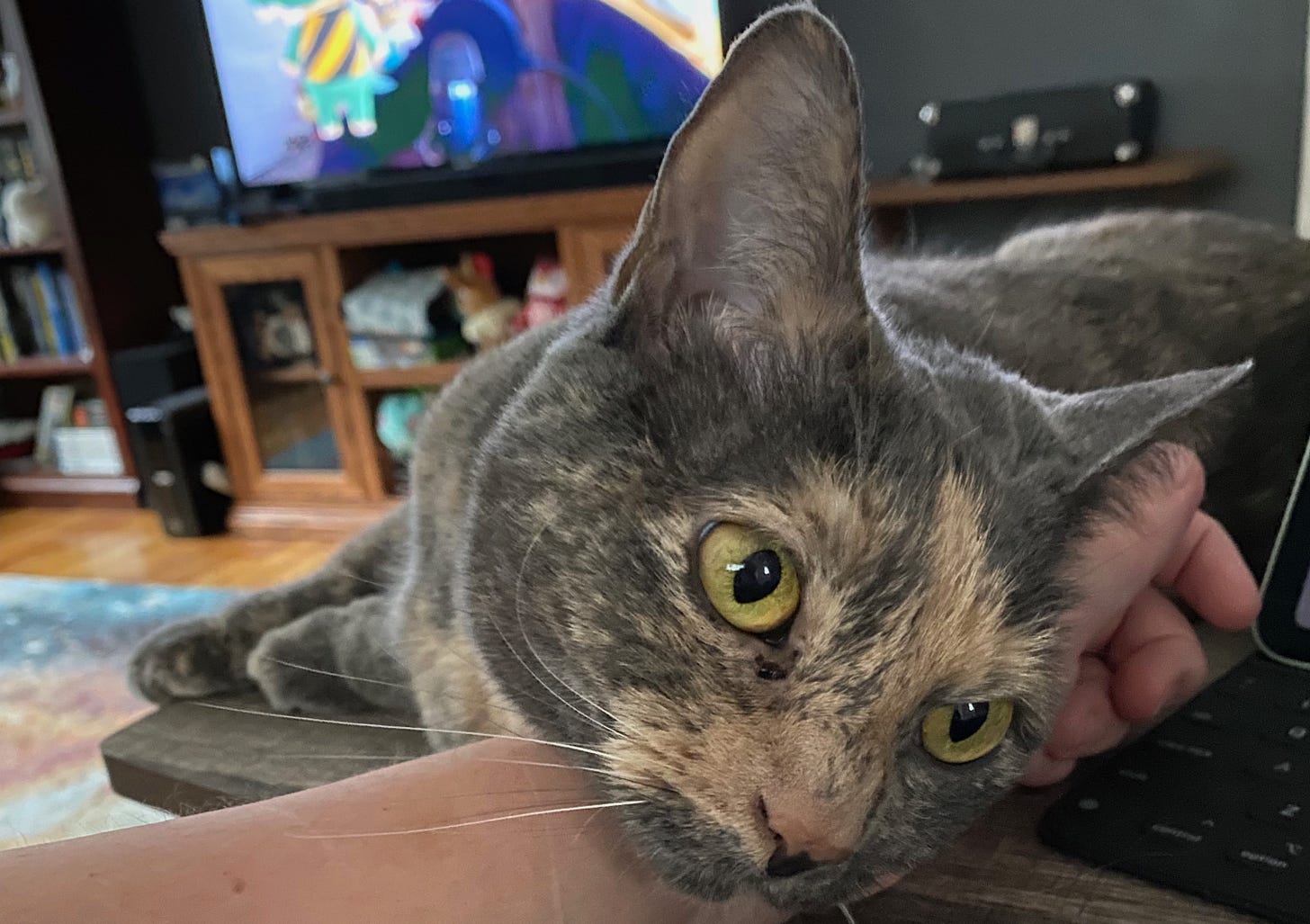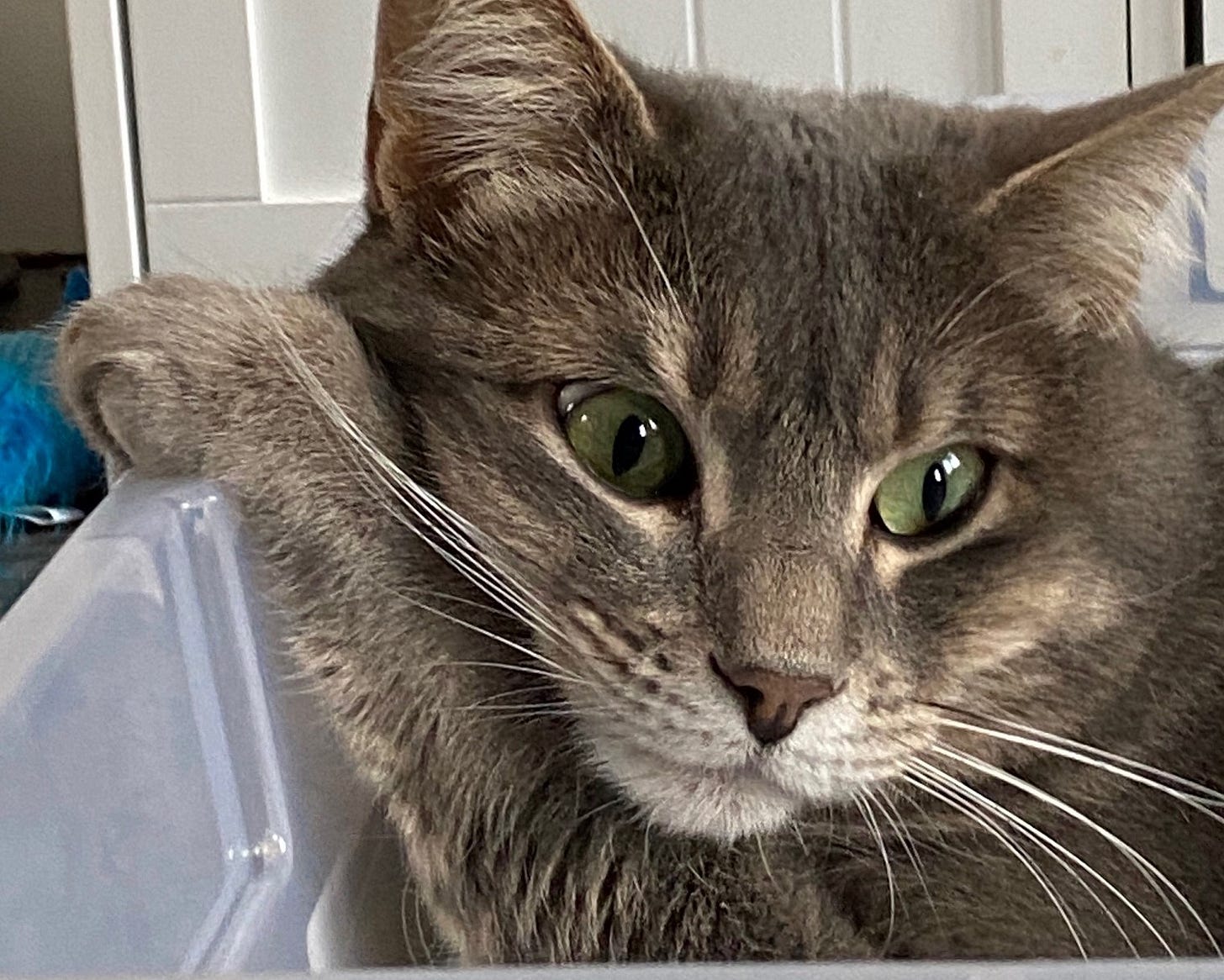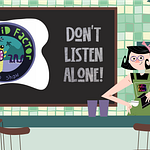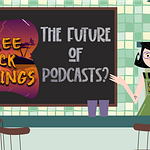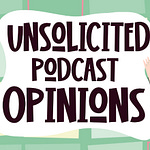In case you haven’t realized it, I am what Joseph McCarthy might have called “a damn pinko Commie,” and a lot of this episode’s content is explicitly rooted in my personal ideology. No pretense of objectivity here.
Workers of the world, unite!
Annotated Transcript
Hello, listeners!
I’m Katie Nolan, and this is Unsolicited Podcast Opinions, the show where you get more than my two cents… you get the whole damn dollar.
I love podcasts. I kind of won’t shut up about podcasts. So my housemates are sort of ready to stage an intervention. So obviously the best way to keep that from happening is to host my own podcast, where I can channel all the opinions nobody asked for and tangents nobody expected.1
Today, I want to talk about a little podcast known as Shameless Acquisition Target.
“Want to talk about” may be an exaggeration. I have extremely complicated feelings about this series – a series which is enormously popular with all of the podcast professionals I want to impress. Its host, Laura Mayer, is now executive producer of podcast programming at ABC Audio. And my own show is called Unsolicited Podcast Opinions, not Unpopular Podcast Opinions.
But Alicia, my executive producer, is really excited about this episode, and I live to make people happy. So I’m going to borrow some of Laura’s shamelessness and go for it.
Now, before I can talk about the podcast, I need to give you a little backstory about me.
In 7th grade, I read Behind the Scenes of Star Trek: Voyager and decided that I wanted to write for television. I wanted it so much that I went and got a degree in screenwriting & playwriting many years later.
But the idea of moving to New York or L.A. absolutely terrified me — still does — so instead I settled down in Washington, DC, not far from where I grew up, and ended up working in documentary television for more than a decade. That’s how I met Alicia.
Then the pandemic hit, the network I worked for went through a corporate merger and decided it didn’t need me anymore, I moved with my best friend to Minnesota… and Alicia invited me to do development work with her for a podcast production company.
All of which to say, Shameless Acquisition Target is not a podcast I would have listened to, or even heard of, if I hadn’t gotten involved in the podcasting industry.
Shameless Acquisition Target is a limited run podcast series by Laura Mayer, where she investigates the ins and outs of money in podcasting while doing everything in her power to get bought out. As she explains in the first episode:
Laura: My feelings about watching my colleagues rake it in by starting and selling companies wasn’t just jealousy around the money they made; it was mainly jealousy of their ability to put themselves fully out there. To not hide behind another company, to push forward. A shamelessness.
Laura: So I’m out here on this podcast trying to get mine. And I’m going to help you, dear listener, get yours too.
I admit, I put off listening to it for awhile. Partly because I’m a leftist who wants alternatives to capitalism rather than advice on how to participate in it.
Partly because I’m a hipster who instinctively goes “Ugh, I’m not interested in popular things.”
And partly because it didn’t sound like my type of podcast.
There are two types of podcasts, if I I may be incredibly reductive: ones that come out of the radio tradition, and ones that come out of the internet tradition.
I almost exclusively listen to podcasts from the internet tradition, and Shameless Acquisition Target is very radio.
You may be asking yourself: “Huh?” I’ll explain.
Podcasts that come out of the radio tradition…sound like they could be on the radio. That tradition informs everything from the they way they structure the story to the level of sound design, the kind of sound design, to the very cadence of the host’s voice in many ways.2
Podcasts that come out of the internet draw their style and influences from places like YouTube and social media. They tend to be more off-the-cuff, a bit more roughly edited, a little less -- I don't want to say "polished" but...in some ways, intentionally unpolished.3
Shameless Acquisition Target is HEAVILY produced. It has an originally written & composed theme song; it has a structured narrative that weaves between Laura talking to the audience and interviews she’s conducted. Each episode ends with her rattling off the amount of money she’s spent and the number of people who worked on the show with her. It is a huge team.
So, to be honest about my biases, I was expecting it to feel inauthentic. I really didn’t expect to see myself reflected in Laura. But then she shared how she decided to work in radio, and it was like looking in a mirror.
Like, omfg. It me!
Laura: Around the same time as the chicken shit to chicken seed situation, I heard my first quote podcast quote, which was an episode of the radio show This American Life.
Laura: My conclusion in discovering this wonder was that I needed to work in radio. I imprinted on this path like a feral kitten to an older duck in one of those viral interspecies friendship videos. This is to say, from teenagehood forward, I had every ounce of determination focused on my career. On this particular career.
Throughout the series, Laura is incredibly open and vulnerable. I love her sense of humor and her charm. In a lot of ways, she’s who I want to be when I grow up.
And I think it’s because I relate to Laura so strongly that my feelings about the show are complicated and uncomfortable.
Shameless Acquisition Target doesn’t tell the story that I wanted it to tell.
In the first episode, Laura shares the story of her father’s business successes – and failures.
Laura: What I saw growing up: businesses (controlled by a man on an island or not) going bust. I saw how the financial ups and downs of these businesses determined the emotional cadence of my entire family. I saw how the businesses’ failings caused me to not have a full pair of gloves for several Chicago winters. How I hid my hands from my teachers so they wouldn’t know.
And she shares her goals for the podcast:
Laura: What I want to do on this show, and in my professional life, is to figure out how to catch these cycles just right. So I can own a house. So my kid can go to college without wild student debt. Basically so that I can earn the kind of stability that I’ve always been seeking.
This was the first sign that Laura and I have very different ways of looking at the world. I am a radical leftist with a bone-deep skepticism of capitalism. In my view, she may as well be looking to build her 401K with roulette winnings. Scott A. Wolla at the socialist Marxist communist organization the Federal Reserve Bank of St. Louis totally agrees with me.
Like a roller coaster, the business cycle has ups and downs. …It would be much easier to plan and invest for the future if recessions were easy to predict, but they are not. Rather, they are unpredictable and irregular.4
End quote.
(For the record, I do not think Scott A. Wallo agrees with me. But his article about the business cycles and recessions still works with my point.)
The fact that Laura and I have different outlooks on capitalism isn’t a problem. I find a lot of value in different perspectives, and I love me some experiments.
But then she had the unmitigated gall to be dangerously relatable. She thinks the Lean In philosophy is bullshit!5 She filled the podcast with silly musical numbers! I live, die, and live again for silly musical numbers!
So a part of me kept expecting that she would tell the kind of story that I would have told in her shoes.
I kept forgetting that she isn’t me and she has her own way of interacting with the world.
Throughout the series, she tells stories about the misogyny she’s encountered in her career and systemic issues that plague our industry. And yet she never outright names them. It’s very wink-wink nudge-nudge you know what I mean, ladies.
Laura: Episode two of the show, I made a t-shirt featuring Eleanor Roosevelt wearing a black founder-style turtleneck holding a tiny iPhone like a bottle of Theranos blood. This offended someone involved in the actual podcast I was referencing. That person used his position in the industry to stop me from getting at least three deals as a producer who would be contracted to create series.
Laura: I know this because several people told me this. Again, because I — a professional woman — made a joke about his show celebrating professional women.
And this, again, isn’t necessarily a flaw. Many journalists hesitate to openly connect stories with systems of oppression because they don’t want to editorialize. They see their job as presenting the facts and letting the audience draw their own conclusions.
This is also what kind of frustrates me about journalists. I personally don’t believe objectivity is ever really possible, and trying to be “objective” is lying to yourself & your audience. What I believe and what I try to practice is that we have to be open and honest about what our perspectives are, what framework we’re using to understand the world – and we then need to draw conclusions with which audiences can either agree or disagree, but they know where we’re coming from.
Which I guess actually means I do think it’s a flaw, but it feels unfair to call it a flaw when it’s part of a long-established tradition and journalistic code of ethics.
And in the end, when she concludes her journey, she takes away this:
Laura: Like Charlie and Grandpa Joe, I was often scolded or marginalized for drinking the fizzy lifting, meaning for doing my job well and especially for daring to be myself while doing it. So I learned to be some different version of myself at work. I learned to make my authentic self as small as possible professionally, to avoid punishment. This smallness, this inoffensiveness, may have served my career in the short term, sure, but it also erased me. This show has made it impossible for me to hide who I am to other people.
Laura: In this series, I made a declaration to you all about how much I care, how hard I work. Being a hard-working carehard, a tryhard loser, it may be cringe, but that’s just who I am.
It left me hollow.
On the one hand, being your authentic self is an act of radical resistance. There is incredible power to owning who you are, being open and vulnerable and proud. I think there are a lot of people who will take comfort and courage from her. It’s one of the reasons I connect so strongly to her.
But at the end of the day, is “embracing shamelessness” really that much different from “leaning in”?
Like, is Laura unable to buy a house because she’s been making herself small and building up other people’s companies instead of standing behind her own name? Because she wasn’t shameless enough?
Or did she lose out on a financial windfall because she was stripped of her phantom equity as punishment for quitting her job?6 Because there was no system in place to protect her from the punishment of the powerful?
How much can those of us with multiple marginalized identities take away from the lessons that she learned?
Shameless Acquisition Target has all of the ingredients for a powerful systemic critique.
I can see a journey from “assuming that I just have to be more shameless” to recognizing the barriers and flaws inherent in the system and a vision for what a better system might look like.
So much of it is already there. In episode 2, she talks about the economic forces behind new podcasts all sounding the same. In episode 3, she sees how TV brings in big money but puts people in power who don’t understand or care about podcasting as its own art form. These are great bones.
And then in episode 4, she interviews people whose work has been acquired, but misses an opportunity to explore the dark side of acquisitions. While that episode of her podcast came out before Spotify axed 11 of the podcasts it had acquired,7 there have been other disastrous acquisitions she could have covered. (I will refrain from ranting about the Viacom-CBS merger, because that’s TV and not podcasts, but trust and believe that I have feelings about it.)
Her celebration of “Tryhard Losers” and Shark Tank entrepreneurs in episode 5 reminded me kind of uncomfortably of an Entrepreneurship class I took. It valorized the entrepreneurs who built businesses in order to sell them for profit, and kind of poo-pooed the so-called “lifestyle businesses” that some entrepreneurs create just to earn enough money to live.8 As someone who just wants enough money to live and collect Monster High dolls, I felt kind of unwanted.
But Episode 6 was my biggest disappointment and frustration.
I cringed throughout the entire interview with Ira Glass. It felt like a masterclass in why you shouldn’t meet your heroes. To me, he sounded like he didn’t want to be there and didn’t care about what she was doing.
The interview content also didn’t really add anything valuable to the narrative by that point. Like, we were in the conclusion and it was very … disconnected from the rest of the series. Like, there probably is useful material in talking to Ira Glass about how he structured This American Life as a business, but not at the end of the series. Nothing was building to that point.
So like I said earlier, my feelings are complicated.
I have ideological disagreements. I also have to be honest and admit I am horrifyingly jealous of Laura’s talent and success. I resent Laura. I want to be Laura. I would cut off my right leg to work with Laura. It’s like the bisexual experience as applied to careers instead of romance.
I don’t think I’ll ever re-listen to the podcast – not for fun, anyway – but I am still subscribed to its RSS feed, which was purchased by Gilded Audio.9 I’m curious to see where the podcast will go and whether they’ll ever join me as comrades in the glorious revolution. Probably not, but hope springs eternal.
I will now shamelessly ask:
Are you subscribed to Unsolicited Podcast Opinions? You get a fresh batch of steaming hot podcast opinions every other week. And if you opt for a paid subscription, you’ll get exclusive behind-the-scenes material and even more opinions. Just go to unsolicitedpod.com .
You can also share your own opinions by emailing katie@unsolicitedpod.com.
Unsolicited Podcast Opinions is written & produced by yours truly, who shamelessly put their name in their company, “Katie Nolan Studio.”
It’s executive produced by the wonderful & talented Alicia Green – say hi, Alicia!
Alicia: Hello, Katie!
Until next time, dear listener.
One of these days I will stop slandering my most excellent housemates for comedic value. That day is not today.
This is my own analysis. For additional examples, listen to podcasts like Sound Judgement.
Again, my own analysis, but I would cite Double Love and Behind the Bastards as ones out of the internet tradition. They both have minimal sound design and leave a lot of the behind-the-scenes messiness in the actual show.
Did you miss or forget about the Lean In phenomenon? Here’s a great essay that explains what it is and what its issues are.
Laura goes into detail about what happened in episode 1, starting around the 14:00 mark.
At least, that’s how I felt when taking the course. Our textbook was Entrepreneurship by Donald F. Kuratko.


